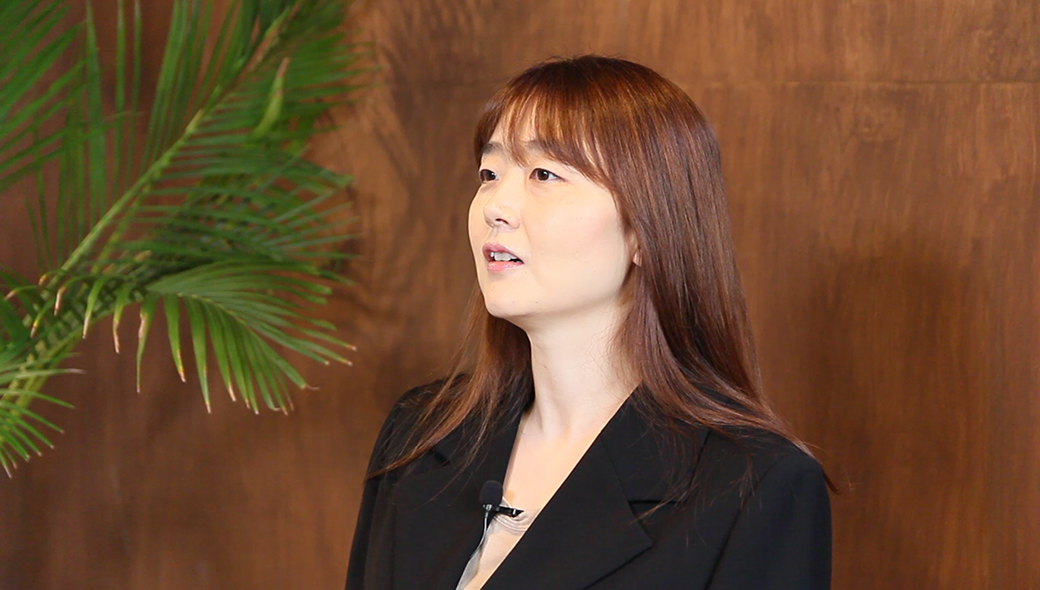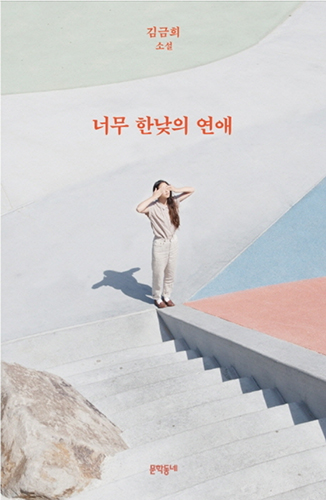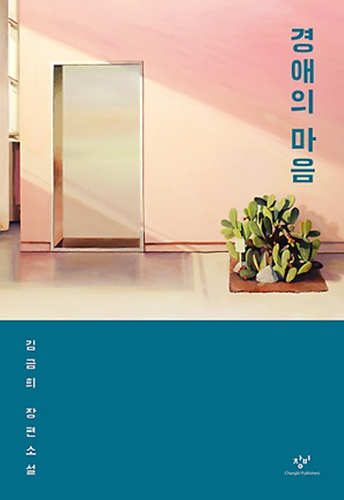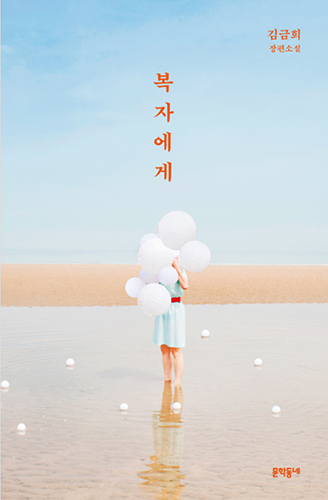|
Writer Kim Keum-Hee The Warm Consoling Power Melted Within the Letters
2020.12.07
The Novels of writer Kim Keum-Hee could not be warmer. The heartwarming stories would melt every reader's heart. There are sources from daily life that readers can relate to, and the social issues she covers make you have a profound look at them. The in-depth impression and healing you get after finishing her books make you wait for her next work. Following is an interview with writer Kim Keum-Hee, who has been an active writer of short, medium, and full-length novels ever since she won the New Writers' Contest of Hankook Ilbo with her ‘Your Document’.
Please say hello and introduce yourself to readers of K-Book Trends.
Hello, I am novelist Kim Keum-Hee, and I've been writing novels for 11 years. I've released Dear Bokja (Munhakdongne) recently.
If you have a specific work or sentence from your stories that you would like to introduce to our readers, what would it be?
I became well-known among readers with my short novel ‘Too Bright Outside for Love’. Readers picked "I love you, today as well" as their favorite line. The characters in their 20s say that they love the other when they are in a frustrating and challenging situation where they cannot predict the future, even the next day, but have blasting emotions at that moment. The line entails anxiety that tomorrow might be different from today. It is highly meaningful to me, as many readers liked that sentence.
Could you please tell us more about your newest novel Dear Bokja?
It's a story about two friends, Youngchorong and Bokja, who have spent their childhood on Jeju Island together. The main character Youngchorong experiences environmental change as she moves to a dependant island of Jeju. It is Bokja that helped her to get used to things in many ways. But just like how human relationships go in childhood, a trivial misunderstanding splits the two, and they end up growing away from each other with the tie between them left entangled. Then 20 years pass, and Youngchorong, who has become a judge, is assigned to Jeju Island. There she meets her friend Bokja again, her long childhood friend. The progress of their relationship and whether the affection and friendliness they feel for each other will return are mainly described in the story. You can also see how the two girls from totally different backgrounds will be remembered by each other.
You've been saying that you want to write a story with Jeju Island as the background. What was Jeju Island to you?
Well, Jeju is a totally different environment from the city I am living in, and its people are also quite different from those in the mainland. So I've always wanted to write a story with it as the background when I build up enough capacity as a writer. Luckily, I had a chance to apply for a residence program for writers where I could stay on Jeju Island for a season. I thought it was like destiny to me. I could learn many things and make many sketches of places on the island. If anyone asks me why I was so eager to write about Jeju, I would say, "attracted by something that I have zero knowledge about." I began writing when I returned to Seoul after finishing sketches on Jeju Island. As I was put in a situation where I had to write about Jeju – an island that I always wanted to go to – when traveling is limited due to the pandemic, I think I reflected too much of my mind missing the island. Maybe that's why the work feels a bit ardent. (Laughs)
We heard that the tragic 1999 Incheon Pub Fire was the motif for Kyungae's Heart, and the industrial accident of nurses on Jeju island was referred to in Dear Bokja. You tend to cover various social issues in your stories. Could you please tell us why?
I've always been thinking that I am also related to social issues as I live. I could turn the fire incident into the novel Kyungae's Heart as I have lived my whole life in Incheon, and my heart broke when I heard of the news. For Dear Bokja, people that particularly came into my eyes in Jeju Island were workers. So, there were quite a lot of people working in the fishing and tourism industry like Haenyeo (female divers), and when I was thinking of writing a novel about their life, I got to know the heart-breaking industrial accident that took place on the island. I felt that talking about such incidents in a novel would be a big step toward regaining rights for more female laborers. And I think that was how I naturally got to cover social and historical issues within an area and mix them with individuals' lives.
The Audio-book series was quite an amazing experience,and it was nice to have greater readership.
Dear Bokja was first serialized as an audiobook before the official publication. How was it different from your previous works, and how did you feel?
When I was first suggested about serializing an audiobook, I had to think about how I would write it. Because listening and reading are different in how long readers can concentrate, I had to consider how well the story can be delivered to the listeners. And the answer I got was writing the story in the style of a letter. It was the most effective way of delivering the story considering the composition and scenes of the book. As a letter is a highly private medium exchanged between individuals, I thought writing the story in a letter might be helpful. It would enhance narrative delivery by recalling the listeners' experience related to it. So I came up with this letter format as it would be serialized as an audiobook. Literary works mainly revolve around the writer's values and the overall quality of the story, but I had to think of who is going to enjoy my work as the platform is different. It was quite a new experience, and I felt the warmth from readers as they were mostly nice and friendly. If a second chance is given, I might give it a try again.
What was the most impressive comment that you received during the series of the audiobook?
The audio clips were uploaded at midnight, and I would always go to bed after reading the comments the first-listeners left. Some of the listeners would correct some wrong information, for example, the nuance of the Jeju dialect and information about the real figures that appeared in the story. Such interaction with the listeners was a magnificent experience for me.
Readership expansion is indeed important,but I really like how readers remain fans of the author they like.
The news says Dear Bokja began its third printing during the pre-sale period before the official release. What do you think about this explosive popularity?
What really helps me is the readers that read my previous work move on to my next work. Expanding readership is important, for sure, but I really like how readers remain fans of the author. It's because, you know, I can write for more than several decades, and my readers, they are really precious to me. (Laughs). When I released my second full-length novel, I was worried how much the readers from my previous work would have interest in it, but how it turned out in the market sounds so positive that I am relieved now. I also grew some confidence that even though I make new attempts, my readers would accept them.
What are your plans for the future?
I'm thinking of publishing a short-novel collection in the first half of next year with all the short stories I've released since 2019. You know, this short novel as a genre vividly reflects the changes of the writer or the writer is going through. So, I think you might be able to take a glimpse at what kind of things I am doing lately through the collection.
Before wrapping up, what would you like to say to our subscribers?
We are undergoing an unprecedentedly challenging time due to the pandemic. All of us, not only Koreans but overseas readers, too. Some may fear why we are going through this and how the world will change in the future. I think it is like an empty schedule where we can think about future changes in our life. So, please, stay healthy. Good moments will follow after, so I hope you spend this hard time preparing for those moments that will be back someday.
Organized by Lee Ji-Hyeon
|
Pre Megazine
-

Jakkajungsin Publishing Co.
VOL.69
2024.04 -

Writer Yun Jung-Eun
VOL.69
2024.04 -

Jumping Books Publishing House
VOL.68
2024.03 -

Writer Kim Hwa-Jin
VOL.68
2024.03 -

Publisher Hyohyung
VOL.67
2024.02 -

Writer Minha
VOL.67
2024.02 -

Almond Publishing
VOL.66
2024.01 -

Writer Kwon Jung-Min
VOL.66
2024.01 -

Hakgojae Publishers
VOL.65
2023.12 -

Writer Kim Hye-Jung
VOL.65
2023.12 -

Eidos Publishing House
VOL.64
2023.11 -

Writer Hwang In-Chan
VOL.64
2023.11 -

Munhakdongne
VOL.63
2023.10 -

Writer Chang Kang-myoung
VOL.63
2023.10 -

Happywell Publishing
VOL.62
2023.09 -

Writer Baik Soulinne
VOL.62
2023.09 -

Dasan Contents Group (Dasan Books)
VOL.61
2023.08 -

Writer Lim Kyoung-Sun
VOL.61
2023.08 -

SpringSunshine Publishing Co.
VOL.60
2023.07 -

Writer Lee Kyung-Hye
VOL.60
2023.07 -

Human Cube
VOL.59
2023.06 -

Doctor Jeong Jae-Seung
VOL.59
2023.06 -

Anonbooks
VOL.58
2023.05 -

Writer Son Bo-Mi
VOL.58
2023.05 -

Namhaebomnal
VOL.57
2023.04 -

Writer Kim Bo-Young
VOL.57
2023.04 -

Hugo Publishing
VOL.56
2023.03 -

Writer Cho Kwang-Hee
VOL.56
2023.03 -

Balgeunmirae Publishing Co.
VOL.55
2023.02 -

Writer Lee Byung-Ryul
VOL.55
2023.02 -

Wisdom House, Inc
VOL.54
2023.01 -

Writer Jeong Jia
VOL.54
2023.01 -

Humanitas
VOL.53
2022.12 -

Writer Kim Yeon-Su
VOL.53
2022.12 -

Songsongbooks
VOL.52
2022.11 -

Writer Eun Hee-Kyung
VOL.52
2022.11 -

Bombom Publishing Co.
VOL.51
2022.10 -

Writer Jiwon Yu
VOL.51
2022.10 -

Hangilsa Publishing Co., Ltd.
VOL.50
2022.09 -

Writer Kim Won-Young
VOL.50
2022.09 -

Moksu Publishing Company
VOL.49
2022.08 -

Writer Yoo Sun-Kyong
VOL.49
2022.08 -

Next Wave
VOL.48
2022.07 -

Writer Park Sang-Young
VOL.48
2022.07 -

A Thousand Hopes
VOL.47
2022.06 -

Writer Bora Chung
VOL.47
2022.06 -

Woongjin ThinkBig
VOL.46
2022.05 -

Dr. Oh Eun-Young
VOL.46
2022.05 -

JECHEOLSO Publishing House
VOL.45
2022.04 -

Writer Jang Ryu-Jin
VOL.45
2022.04 -

Changbi Publishers
VOL.44
2022.03 -

Writer Kim Ho-Yeon
VOL.44
2022.03 -

Mati Books
VOL.43
2022.02 -

Writer Lee Kkoch-Nim
VOL.43
2022.02 -

Picturebook Gongjackso
VOL.42
2022.01 -

Writer Kim Sang-Wook
VOL.42
2022.01 -

Writer So-yeon Park
VOL.42
2022.01 -

Writer Yoo Eun sil
VOL.42
2022.01 -

Kungree Press
VOL.41
2021.12 -

Writer Kim Lily
VOL.41
2021.12 -

Writer Park Yeon-jun
VOL.41
2021.12 -

Writer Yi Hyeon
VOL.41
2021.12 -

A deeper world told through picture books 'Iyagikot Publishing (Story Flower)'
VOL.12
2019.06 -

Author Jeon Min-hee
VOL.12
2019.06 -

Illustrator Kim Hwan-Young
VOL.13
2019.07 -

Travelers sailing through the sea of knowledge - 'Across Publishing Group Inc.'
VOL.13
2019.07 -

Genre Novel Publisher 'Arzak Livres'
VOL.14
2019.08 -

Author Lee Yong-han
VOL.14
2019.08 -

Wookwan Sunim
VOL.15
2019.09 -

East-Asia Publishing
VOL.15
2019.09 -

Author Jo Jung-rae
VOL.16
2019.10 -

EunHaeng NaMu Publishing
VOL.16
2019.10 -

Writer Heo Kyo bum
VOL.40
2021.11 -

Writer Kim So-Young
VOL.40
2021.11 -

Author-illustrator Kim Sang Keun
VOL.40
2021.11 -

ACHIMDAL BOOKS
VOL.40
2021.11 -

Author Kang Gyeong-su
VOL.17
2019.11 -

Moonji Publishing Belongs to the Literary Community
VOL.17
2019.11 -

Author Kim Yun-jeong
VOL.18
2019.12 -

I-Seum
VOL.18
2019.12 -

Kim Cho-Yeop
VOL.19
2020.02 -

Creating a window into the future with books
VOL.19
2020.02 -

Author Serang Chung
VOL.20
2020.03 -

Hey Uhm
VOL.20
2020.03 -

Writer Lim Hong-Tek
VOL.21
2020.04 -

BIR
VOL.21
2020.04 -

Writer Song Mikyoung
VOL.39
2021.10 -

Author-illustrator Kim Dong Su
VOL.39
2021.10 -

Writer Lee Seula
VOL.39
2021.10 -

Tabi Books
VOL.39
2021.10 -

Writer Kim Soo-hyun
VOL.38
2021.09 -

Author-illustrator Lee Myoung Ae
VOL.38
2021.09 -

Writer Hwang Sunmi
VOL.38
2021.09 -

Kidari Publishing Co.
VOL.38
2021.09 -

Writer Sohn Won-Pyung
VOL.22
2020.05 -

Woods of Mind's Books
VOL.22
2020.05 -

Writer Heungeul
VOL.23
2020.06 -

Gloyeon
VOL.23
2020.06 -

Maumsanchaek
VOL.24
2020.07 -

Winners of the 2021 Bologna Ragazzi Award
VOL.37
2021.08 -

Picture book artist Lee Suzy
VOL.37
2021.08 -

Author-illustrator Yi Gee Eun
VOL.37
2021.08 -

Hubble
VOL.37
2021.08 -

Writer Baek Se-Hee
VOL.25
2020.08 -

Bearbooks Inc.
VOL.25
2020.08 -

Author Baek Hee-Na
VOL.26
2020.09 -

Yuksabipyoungsa
VOL.26
2020.09 -

Writer Kang Hwa-Gil
VOL.27
2020.10 -

Kinderland (Bandal)
VOL.27
2020.10 -

Writer Ha wann
VOL.36
2021.07 -

Author-illustrator Myung Soojung
VOL.36
2021.07 -

Writer Jung Yeo-Wool
VOL.36
2021.07 -

Publisher EcoLivres
VOL.36
2021.07 -

Writer Lee Geumi
VOL.28
2020.11 -

Sakyejul
VOL.28
2020.11 -

Writer Kim Keum-Hee
VOL.29
2020.12 -

Geulhangari
VOL.29
2020.12 -

Writer Cheon Seon-Ran
VOL.30
2021.01 -

Hyang Publishing House
VOL.30
2021.01 -

Writer Lee Hee-Young
VOL.31
2021.02 -

Sanzini
VOL.31
2021.02 -

Publisher Prunsoop
VOL.32
2021.03 -

Writer Sim Yun-Kyung
VOL.32
2021.03 -

Hanbit Media
VOL.35
2021.06 -

Hyeonamsa
VOL.33
2021.04 -

Author-illustrator Noh Inkyung
VOL.33
2021.04 -

Writer Cho Won-Jae
VOL.35
2021.06 -

Writer Kim Jung-Mi
VOL.34
2021.05 -

Safehouse Inc.
VOL.34
2021.05













